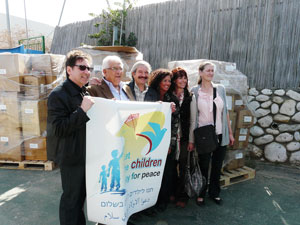 Put down the guns and pick up a soccer ball.
Put down the guns and pick up a soccer ball.
That is one of the goals of the Let Children Play for Peace effort, an organization started in Kansas City by an Israeli Jew and an Egyptian Muslim. Let Children Play for Peace has collected hundreds of new toys and is delivering them in equal amounts to children in Sderot, Israel, and the Gaza Strip. Soccer balls, kites, stuffed animals and more were delivered to Israel last month and will be handed out to children who live in an area where simply playing can be hard to do when surrounded by violence.
“We want to bring attention to peaceful efforts by helping with children’s needs,” said Sam Nachum, the Jew in the partnership. “Most of the time these children have no toys, and we don’t think that is fair.”
Born in Israel, Nachum moved to Kansas City in 1978. He had met Dana, who he would eventually marry, a few years earlier while she was visiting Israel and she lived here. Nachum saw first-hand the effect violence can have on children and how damaging it can be.
“They can forget what it is like to be a child,” he said.
Work on this project began around three years ago during the conflict in Gaza. The reports of the fighting were so bad that Nachum, a member of Chabad House, knew he had to do something to help. One night at a gathering at the Jewish Community Center, a Muslim man, Ahmed El-Sherif, spoke up and Nachum was impressed with him.
“It was very courageous for Ahmed to show up and to speak,” Nachum said. “We began talking and together we came up with the idea of collecting the toys.”
El-Sherif was born in Egypt and, like Nachum, had seen violence before relocating to Kansas City. He and Nachum started the Let the Children Play for Peace organization so that other children might have some relief from the stresses associated with the conflicts in the area.
“Children are the ones that suffer the most, both on the battle field and at home,” El-Sherif said. “Children are innocent yet they still suffer. I think we were inspired to do this because both Sam and I lost a lot of our childhood. People don’t realize how damaging that can be. We want to help kids today, on both sides, try to avoid the same things that happened to us.”
Some could consider toys as luxury items; however El-Sherif and Nachum see them as more than that.
“Most of the time, people send medicine or food during these times,” Nachum said. “The needs of children are often forgotten. But to see their faces light up when they get these new toys, you realize how much they mean to them."
What started as a two-man effort quickly morphed into a large-scale organization with volunteers from a variety of groups and faiths joining.
“We really knew that something had to be done, and to send something that would benefit children, who have no part in the fighting, made sense,” said Nick Awad, a volunteer with Let Children Play for Peace. Awad is a Palestinian Christian, a minority where he is from, and also wants an end to the fighting. “What everyone involved wants is for the shipments to lead to more efforts where people reach out to both sides.”
Awad says that helping children has been a cause that so many different people can support, and the more people that volunteer and donate, the more children that can benefit. Nachum agrees.
“Everyone has come together and been so supportive,” Nachum said “No one has heard the idea, and said they didn’t like it. No matter what side you are one, everyone has been able to remember what the important thing is and that is helping children.”
The help included raising more than $9,000 to pay for the scosts, taxes and other red tape involved with shipping the toys to the Middle East. Nachum and a group of 16 volunteers from Let Children Play for Peace all personally flew out to area to help with the delivery. While there the volunteers received considerable media attention, appearing on television, radio and in newspapers.
“We want to make sure the toys go where they are supposed to go,” Nachum said. “That is everyone’s concern now.”
The deliveries have gone well so far, but the shipment to the children in Gaza is still waiting on final approval. The organizers know they must be diligent when dealing with so much conflict. However, they hope the potential rewards will be more than worth it.
“This help can open the door for dialogue and communication between the two sides,” Sherif said. “Maybe people will think twice before they will do action that will damage a child’s life.”
“Our main goal is that one day, the children of Gaza and the children of Israel can come together and play,” Nachum said. “We want to build a soccer field in-between the two where they can play. That is a dream of Ahmed and me. For these kids to meet on that field instead of the field of battle.”
For more information on this organization or to donate, visit www.letthechildrenplayfor peace.org.


